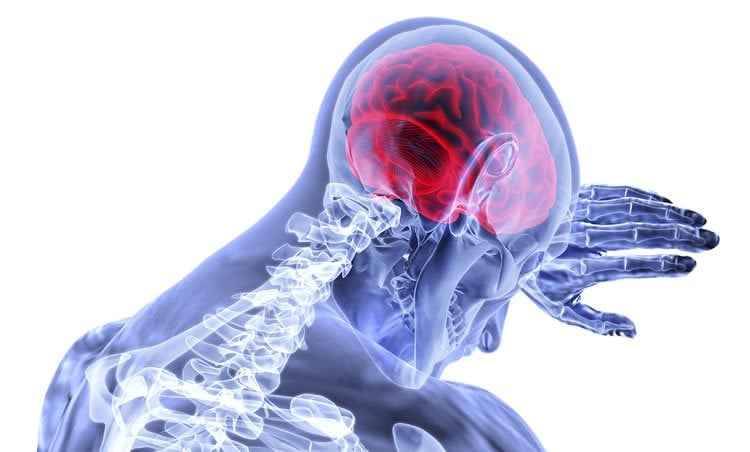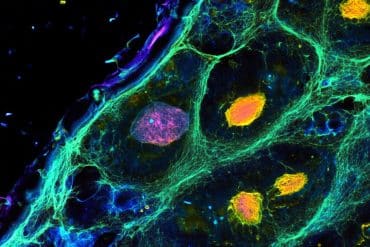Summary: A new study sheds light on how the circadian clock controls inflammatory response. By understanding the link between inflammation and circadian rhythm, researchers believe it may be most effective to target specific conditions at certain times of the day. The findings may also explain why those who experience body clock disruptions are more susceptible to inflammatory conditions.
Source: RCSI.
Researchers at RCSI and Trinity College Dublin have revealed insights into how the body clock controls the inflammatory response, which may open up new therapeutic options to treat excess inflammation in conditions such as asthma, arthritis and cardiovascular disease. By understanding how the body clock controls the inflammatory response, we may be able to target these conditions at certain times of the day to have the most benefit. These findings may also shed light on why individuals who experience body clock disruption such as shift workers are more susceptible to these inflammatory conditions.
The body clock, the timing mechanism in each cell in the body, allows the body to anticipate and respond to the 24-hour external environment. Inflammation is normally a protective process that enables the body to clear infection or damage, however if left unchecked can lead to disease. The new study, led by researchers at Dr. Annie Curtis’s Lab at RCSI (Royal College of Surgeons in Ireland) in partnership with Prof. Luke O’Neill’s Lab at Trinity College Dublin, is published in the Proceedings of the National Academy of Sciences (PNAS), a leading international multidisciplinary scientific journal.
Dr Annie Curtis, Research Lecturer in the Department of Molecular and Cellular Therapeutics at RCSI and senior author, explained that: “Macrophages are key immune cells in our bodies which produce this inflammatory response when we are injured or ill. What has become clear in recent years is that these cells react differently depending on the time of day that they face an infection or damage, or when we disrupt the body clock within these cells”.

Dr. Jamie Early, first author on the study, said: “We have made a number of discoveries into the impact of the body clock in macrophages on inflammatory diseases such as asthma and multiple sclerosis. However, the underlying molecular mechanisms by which the body clock precisely controls the inflammatory response were still unclear. Our study shows that the central clock protein, BMAL1 regulates levels of the antioxidant response protein NRF2 to control a key inflammatory molecule called IL-1β from macrophages.”
“The findings although at a preliminary stage, offers new insights into the behaviour of inflammatory conditions such as arthritis and cardiovascular disease which are known to be altered by the body clock”, added Dr Early.
Funding: Funded by Science Foundation Ireland, the research was undertaken in collaboration between RCSI, Trinity College Dublin and the Broad Institute in Boston, USA.
Source: RCSI
Publisher: Organized by NeuroscienceNews.com.
Image Source: NeuroscienceNews.com image is in the public domain.
Original Research: Open access research for “Circadian clock protein BMAL1 regulates IL-1β in macrophages via NRF2” by James O. Early, Deepthi Menon, Cathy A. Wyse, Mariana P. Cervantes-Silva, Zbigniew Zaslona, Richard G. Carroll, Eva M. Palsson-McDermott, Stefano Angiari, Dylan G. Ryan, Sarah E. Corcoran, George Timmons, Sarah S. Geiger, Darren J. Fitzpatrick, Daniel O’Connell, Ramnik J. Xavier, Karsten Hokamp, Luke A. J. O’Neill, and Annie M. Curtis in PNAS. Published August 20 2018.
doi:10.1073/pnas.1800431115
[cbtabs][cbtab title=”MLA”]RCSI”How the Body Clock Controls Inflammation.” NeuroscienceNews. NeuroscienceNews, 21 August 2018.
<https://neurosciencenews.com/inflammation,body-clock-9721/>.[/cbtab][cbtab title=”APA”]RCSI(2018, August 21). How the Body Clock Controls Inflammation. NeuroscienceNews. Retrieved August 21, 2018 from https://neurosciencenews.com/inflammation,body-clock-9721/[/cbtab][cbtab title=”Chicago”]RCSI”How the Body Clock Controls Inflammation.” https://neurosciencenews.com/inflammation,body-clock-9721/ (accessed August 21, 2018).[/cbtab][/cbtabs]
Abstract
Circadian clock protein BMAL1 regulates IL-1β in macrophages via NRF2
A variety of innate immune responses and functions are dependent on time of day, and many inflammatory conditions are associated with dysfunctional molecular clocks within immune cells. However, the functional importance of these innate immune clocks has yet to be fully characterized. NRF2 plays a critical role in the innate immune system, limiting inflammation via reactive oxygen species (ROS) suppression and direct repression of the proinflammatory cytokines, IL-1β and IL-6. Here we reveal that the core molecular clock protein, BMAL1, controls the mRNA expression of Nrf2 via direct E-box binding to its promoter to regulate its activity. Deletion of Bmal1 decreased the response of NRF2 to LPS challenge, resulting in a blunted antioxidant response and reduced synthesis of glutathione. ROS accumulation was increased in Bmal1−/− macrophages, facilitating accumulation of the hypoxic response protein, HIF-1α. Increased ROS and HIF-1α levels, as well as decreased activity of NRF2 in cells lacking BMAL1, resulted in increased production of the proinflammatory cytokine, IL-1β. The excessive prooxidant and proinflammatory phenotype of Bmal1−/− macrophages was rescued by genetic and pharmacological activation of NRF2, or through addition of antioxidants. Our findings uncover a clear role for the molecular clock in regulating NRF2 in innate immune cells to control the inflammatory response. These findings provide insights into the pathology of inflammatory conditions, in which the molecular clock, oxidative stress, and IL-1β are known to play a role.







